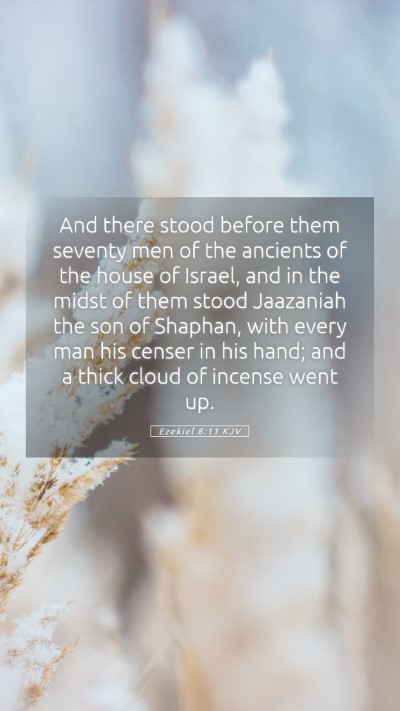Ezekiel 8:11 - Bible Verse Meaning and Interpretation
Bible Verse: Ezekiel 8:11 states, "And there stood before them seventy men of the ancients of the house of Israel, and in the midst of them stood Jaazaniah the son of Shaphan, with every man his censer in his hand; and a thick cloud of incense went up." This verse provides a window into the actions and spiritual state of the leaders of Israel during the prophet Ezekiel's time.
Overview of Ezekiel 8:11
This verse belongs to a vision experienced by the prophet Ezekiel, where he is shown the corruption occurring within the temple in Jerusalem. The setting involves the prominent leaders of Israel, indicating the depth of idolatry and the lack of reverence for God.
Key Components of the Verse:
- Seventy Men of the Ancients: This number signifies a council of leaders, symbolizing governance and authority among the people.
- Jaazaniah the son of Shaphan: This individual is specifically mentioned, suggesting his role as a leader among the elders, possibly highlighting a prominent figure in Israel's idolatrous practices.
- Censers and Incense: The act of burning incense often signifies prayer and worship; here, it represents misguided worship directed towards idolatrous practices instead of God.
- Thick Cloud of Incense: The thick cloud symbolizes the overwhelming nature of their transgressions and the spiritual blindness of Israel during this period.
Bible Verse Commentary
Matthew Henry's Commentary
Matthew Henry highlights that this passage represents the leaders of Israel engaging in idolatrous rites, showing their indifference to the true worship of God. He emphasizes the danger posed by leaders who mislead the people by promoting false worship. This verse serves as a warning against the corrupting influence of leadership on the worship and practice of faith within a community.
Albert Barnes' Insights
Albert Barnes notes that the mention of 'seventy men' is reminiscent of the Jewish Sanhedrin, which was a governing body in Jerusalem. He discusses how these elders, by participating in idol worship, contribute to the moral decay of the nation. Barnes underscores how their actions are in stark contrast to the directives of the Law, illustrating a significant departure from covenant faithfulness.
Adam Clarke's Exegesis
Adam Clarke provides an in-depth analysis, acknowledging the historical significance of incense being offered to false gods. He stresses the importance of recognizing how this act represents not just individual sin, but a collective societal abandonment of God. Clarke encourages readers to reflect on the implications of leadership roles in influencing spiritual direction and the consequences of such deviations.
Understanding the Cultural and Historical Context
The events surrounding the vision in Ezekiel are rooted deeply in the historical context of Israel's spiritual decline. During this period, Israel was entrenched in idolatry, and many leaders discouraged true worship in favor of practices that aligned more with surrounding nations. This scripture analysis serves as a vital reflection on how the actions of influential figures can lead an entire community away from its core beliefs.
Application of Ezekiel 8:11
For contemporary readers, the significance of Ezekiel 8:11 lies in its call for discernment regarding leadership and worship. It prompts individuals and communities to consider the integrity and faithfulness of their leaders in guiding spiritual practices. The verse encourages a return to genuine worship of God and warns against the temptations of idolatry, which can emerge in many forms in modern society.
Additional Bible Cross References
- Jeremiah 29:23: Discusses those who led Israel into sin.
- Ezekiel 14:1-5: Talks about false prophets and their influences.
- Isaiah 31:1: Warns against seeking help from sources apart from God.
- Hosea 4:9: Highlights the behaviors of priests leading people into error.
- Leviticus 10:1-3: Describes the proper way to worship God, contrasting starkly against illicit practices.
Conclusion
Ezekiel 8:11 serves as a profound reminder of the implications of collective sin, particularly as influenced by leadership. The interpretations provided enhance our understanding of Scripture, encouraging deeper Bible study insights. The message invites ongoing discourse in Bible study groups and personal reflections on how to approach leadership and worship in our own lives.
Further Exploration
If you're interested in more in-depth Bible study resources, consider various Bible study guides that explore the Old Testament context or online Bible study lessons that delve into the meaning of difficult passages.


